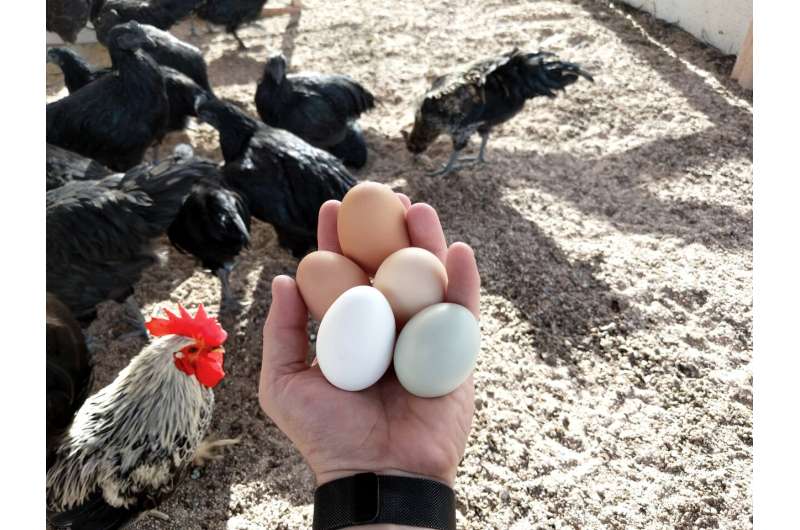This article has been reviewed according to Science X's editorial process and policies. Editors have highlighted the following attributes while ensuring the content's credibility:
fact-checked
trusted source
proofread
New research finds a disconnect between poultry dietary energy and egg production

In previous research, feed intake and egg production parameters were the most common response criteria that researchers used to measure energy responses in poultry.
Professor Michael Persia in Virginia Tech's College of Agriculture and Life Sciences decided to take a look at energy levels in poultry from a different standpoint. This research idea began in 2008–09, when corn prices increased in response to expanded ethanol production as part of the renewable fuels' standard. In the quest to identify and validate alternatives to corn as the primary energy source in laying hen diets, a more wholistic approach to laying hen metabolism was investigated.
What resulted was more than a decade of research conducted by Persia and a team of graduate and undergraduate students in the School of Animal Sciences. What they discovered supported their line of thinking.
At least over the short term, the amount of energy fed to hens doesn't affect the number of eggs produced. Hens will produce eggs as long as they have enough fatty tissue and mass in their reserves to supply the energy to produce them.
"Results suggested that dietary energy has a more pronounced effect on body mass and fatty tissue before more direct performance responses are observed," Persia said. "Therefore, hen body weight and composition can be used as a more sensitive measurement of hen energy status than egg production or feed efficiency."
The research was published recently in the Journal of Applied Poultry Research and is supported by the John Lee Pratt Animal Nutrition Senior Research Scholar Program. Alyssa Lyons, a doctoral candidate in the School of Animals Sciences, is the lead author. She worked in Persia's lab and on this research project beginning as an undergraduate student.
More recently, the cost of dietary oil, the second leading energy component of a diet, has increased with additional biodiesel production. As so, Persia and his team conducted an experiment to evaluate the effects of varying dietary energy on the performance and energy storage in laying hens from 36 to 52 weeks of age.
A total of 252 hens were fed one of seven experimental diets ranging in dietary energy from 2,750 to 3,050 kcal/kg. Egg production, energy intake, feed intake, egg weight, egg mass, and feed efficiency were calculated. Hens were weighed every four weeks and carcass total, lean, and fat mass were determined at 52 weeks of age using a dual-energy X-ray absorptiometry, a type of evaluation.
Results indicated that dietary energy intake impacted the hens' total carcass mass and carcass fat mass before altering the number of eggs they produced.
"Although egg production was unaffected, total mass, body weight, and fat mass were significantly decreased with decreasing dietary energy and were directly correlated with dietary energy," Persia said. "This indicated to us that hens will continue to produce eggs at the expense of energy body reserves over short-term production."
This discovery could have substantial environmental and economic impact, Persia said.
"Everything we can do to more accurately determine the requirements of these birds will reduce the cost of eggs—efficiency from a feeding standpoint leads to efficiency from an economic standpoint," he said.
"There is also a large environmental component to that as well. Anytime we can increase the utilization of energy or nutrients from the diet, that's less that actually comes out on the back end as manure. If we can more efficiently utilize our resources and put them into the bird or into the egg, that will help the environmental footprint."
More information: A.M. Lyons et al, Estimating energy utilization in laying hens: what are the best response criteria?, Journal of Applied Poultry Research (2023). DOI: 10.1016/j.japr.2023.100357
Provided by Virginia Tech



















